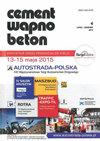Foamed glass granulated-based self-compacting mortars: open-porosity effect on rheological and mechanical properties
IF 0.6
4区 工程技术
Q4 CONSTRUCTION & BUILDING TECHNOLOGY
引用次数: 1
Abstract
The foamed glass is currently used in the manufacture of concretes as aggregate to produce lightweight concrete. The lightness of the concrete is assured by the important porosity of foamed glass granulates [GFG], however, they have a closed porosity with a smooth surface. In this respect, this study aims to use foam glass granulates with open-porosity, to produce lightweight self-compacting mortars. GFG were prepared from the glass powder – glass cullet and foaming agent – limestone, according to the current applied process for GFG – heat treatment at 850°C for 20 min. Then from GFG the sand fine aggregate – 0/5 mm was prepared by crushing and sieving. The self-compacting mortars were obtained using natural sand as fine aggregate and other mortars with granulated foam glass substituting sand at volume ratios: 30, 50 and 100 %. Rheological tests of fluidity and physical properties, i.e. density and porosity, by measuring absorption of water and mechanical tests were carried out on studied mortars. The interface of cementitious matrix/GFG granules study shows that open-porosity of GFG sand has favored adhesion to cement matrix, without causing the segregation of the mortar phases. Also, the decrease of the compressive strength for mortars exhibiting a specific lightness, was found. It should be noted that the latter property is very important in construction.泡沫玻璃颗粒基自密实砂浆:开孔率对流变学和力学性能的影响
泡沫玻璃目前用于制造混凝土作为骨料,以生产轻质混凝土。泡沫玻璃颗粒[GFG]的重要孔隙率保证了混凝土的轻盈性,然而,它们具有光滑表面的封闭孔隙率。在这方面,本研究旨在利用具有开孔性的泡沫玻璃颗粒,生产轻质自密实砂浆。以玻璃粉-玻璃碎料和发泡剂-石灰石为原料,按目前应用的玻璃粉工艺- 850℃热处理20 min制得玻璃粉,再经破碎筛分制得0/5 mm的砂细骨料。以天然砂为细骨料,以泡沫玻璃颗粒代替砂,按体积比分别为30%、50%和100%制备自密实砂浆。通过测量吸水率,对所研究的砂浆进行了流动性和物理性能(即密度和孔隙率)的流变试验和力学试验。水泥基质与GFG颗粒的界面研究表明,GFG砂的开孔性有利于与水泥基质的粘结,而不会引起砂浆相的离析。此外,还发现了具有特定重量的砂浆的抗压强度降低。需要注意的是,后一种属性在施工中是非常重要的。
本文章由计算机程序翻译,如有差异,请以英文原文为准。
求助全文
约1分钟内获得全文
求助全文
来源期刊

Cement Wapno Beton
CONSTRUCTION & BUILDING TECHNOLOGY-MATERIALS SCIENCE, COMPOSITES
CiteScore
1.30
自引率
28.60%
发文量
0
审稿时长
>12 weeks
期刊介绍:
The Publisher of the scientific bimonthly of international circulation, entitled "Cement-Wapno-Beton" ["Cement-Lime-Concrete"], is the Fundacja Cement, Wapno, Beton [Foundation Cement, Lime, Concrete]. The periodical is dedicated to the issues concerning mineral setting materials and concrete. It is concerned with the publication of academic and research works from the field of chemistry and technology of building setting materials and concrete
 求助内容:
求助内容: 应助结果提醒方式:
应助结果提醒方式:


